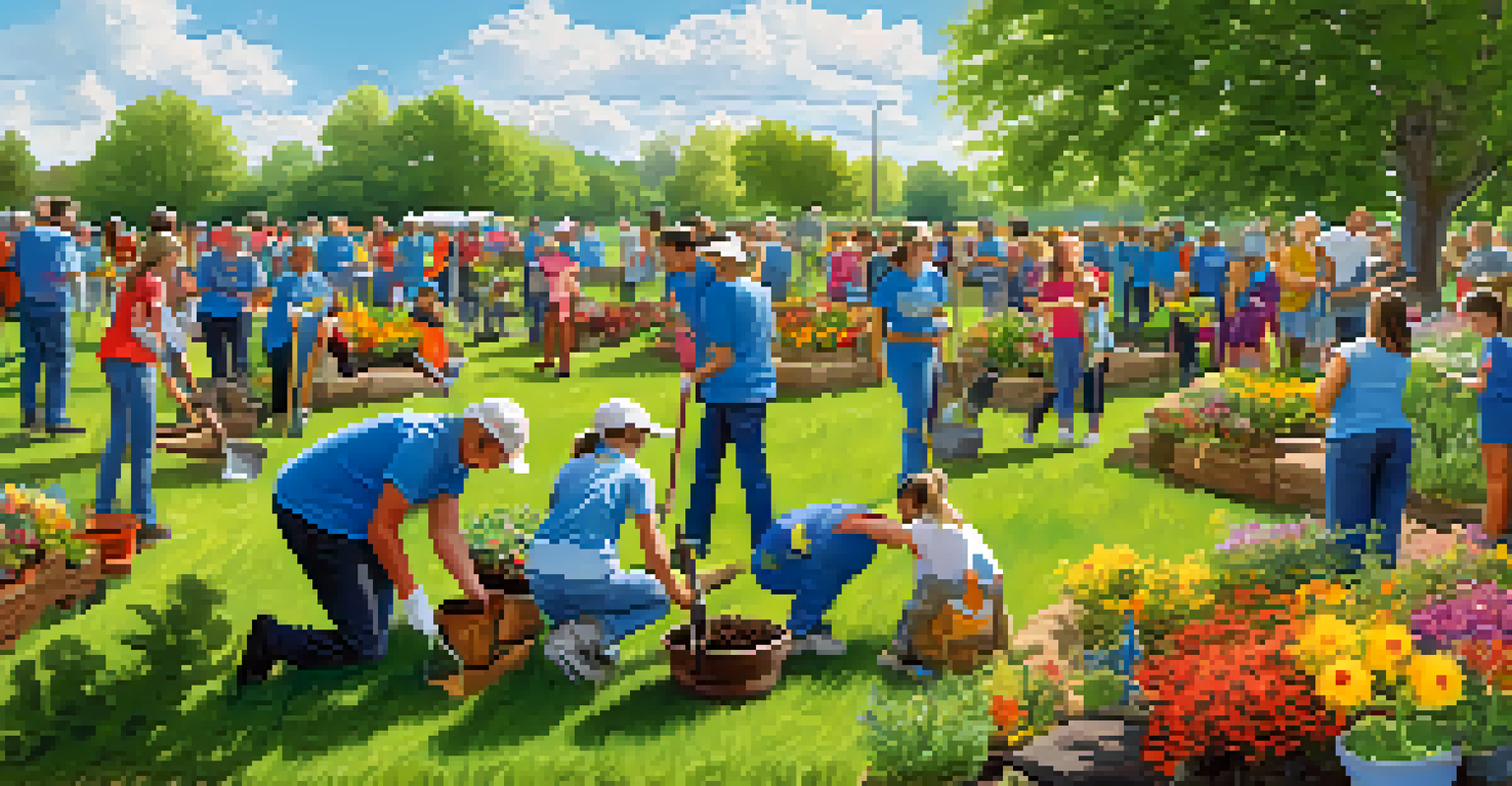How to Build a Supportive Community for Mental Health

Understanding the Importance of Community for Mental Health
A supportive community plays a crucial role in mental health, as it provides individuals with a sense of belonging and connection. When people feel part of a group, they're often more likely to share their struggles and seek help, reducing feelings of isolation. This sense of community can be especially vital during challenging times, as shared experiences can foster empathy and understanding.
Alone we can do so little; together we can do so much.
Moreover, communities can provide resources and information that aid mental health, such as access to local support groups or educational workshops. These resources help individuals navigate their mental health journeys more effectively. By creating an environment where mental health is openly discussed and prioritized, we can help each other thrive.
Ultimately, a strong community can be a powerful buffer against mental health challenges. Whether it's friends, family, or local organizations, support can come from various avenues, making it essential to cultivate these connections for overall well-being.
Creating Safe Spaces for Open Conversations
To build a supportive community for mental health, it's crucial to create safe spaces where individuals feel comfortable sharing their thoughts. This means fostering an environment free from judgment, where everyone can express their feelings without fear of stigma. Safe spaces can be physical locations, like community centers, or virtual spaces such as online forums and social media groups.

Encouraging open conversations about mental health can help normalize these discussions, making it easier for individuals to seek help when needed. One effective approach is to host regular meetups or discussions focused on mental health topics, allowing members to share experiences and coping strategies. This not only builds trust but also strengthens community bonds.
Community's Role in Mental Health
A supportive community fosters belonging and reduces isolation, making it crucial for mental health.
In addition, consider implementing policies or guidelines that promote respectful dialogue within these spaces. By setting clear expectations around communication, you can ensure that everyone feels valued and heard, further reinforcing the sense of safety and support.
Encouraging Empathy and Understanding in the Community
Empathy is the cornerstone of a supportive community. Encouraging individuals to practice empathy can lead to deeper connections and a better understanding of each other's experiences. When people take the time to listen and validate others' feelings, it fosters an environment where everyone feels understood and accepted.
The greatest discovery of my generation is that a human being can alter his life by altering his attitude.
One way to cultivate empathy is through storytelling. Sharing personal experiences, whether through organized events or informal gatherings, allows community members to connect on a deeper level. When individuals hear about others' challenges, it can inspire compassion and motivate them to offer support.
Moreover, consider incorporating empathy training into community programs. Workshops or activities focused on developing empathy skills can be beneficial, creating a ripple effect as individuals apply these skills in their everyday interactions.
Providing Resources and Support for Mental Health
A supportive community should offer various resources to aid mental health, such as access to counseling services, hotlines, and educational materials. By partnering with local mental health organizations, communities can provide workshops, training sessions, or informational sessions that empower individuals to take charge of their mental health.
Additionally, consider creating a resource hub, whether online or in a physical space, where community members can easily access information. This could include self-help tools, guides on coping strategies, or lists of local therapists. The more accessible these resources are, the more likely individuals will utilize them.
Creating Safe Spaces to Share
Establishing environments free from judgment encourages open conversations about mental health.
Furthermore, fostering connections with mental health professionals can enhance community support. Inviting guest speakers or organizing panel discussions can break down barriers and encourage individuals to seek professional help when necessary.
Building Strong Connections Through Activities and Events
Organizing community activities can provide opportunities for individuals to connect and bond over shared interests. Whether it's a sports event, art class, or book club, these gatherings can foster friendships and provide a platform for discussing mental health topics in a relaxed setting. Activities can also serve as a distraction from stress, offering a break from daily challenges.
Moreover, consider incorporating mental health awareness activities into community events. This could include workshops, seminars, or even fun activities that promote mindfulness and well-being. By integrating mental health into community events, you actively contribute to the normalization of these discussions.
Creating a calendar of events that prioritizes mental health can also keep the community engaged and informed. Regular activities ensure that individuals have consistent opportunities to connect, learn, and support one another.
Encouraging Volunteerism to Strengthen Community Bonds
Volunteering is a powerful way to build community while supporting mental health initiatives. When individuals come together to work towards a common goal, it fosters a sense of purpose and belonging. Engaging in volunteer activities can also provide emotional rewards, as helping others often leads to increased feelings of happiness and fulfillment.
Consider organizing volunteer opportunities that focus on mental health, such as fundraising for local organizations or participating in awareness campaigns. These activities not only strengthen community ties but also raise awareness about mental health issues and the importance of support.
Empathy Strengthens Community Bonds
Practicing empathy through storytelling and training deepens connections and understanding among members.
Additionally, volunteering can help individuals develop new skills and meet like-minded people who share similar passions. This can lead to lasting friendships and a supportive network that extends beyond the volunteer setting.
Promoting Inclusivity and Diversity in the Community
A truly supportive community recognizes and values diversity. Promoting inclusivity ensures that individuals from all backgrounds feel welcome and represented. This is especially important in mental health discussions, where experiences can vary greatly based on cultural, socioeconomic, and personal factors.
To foster an inclusive environment, consider actively seeking input from diverse community members. This can involve hosting focus groups or surveys to understand the unique needs and challenges faced by different populations. By listening to a wide range of voices, you can create programs and resources that resonate with everyone.

Moreover, celebrate diversity through community events that highlight various cultures and experiences. This not only enriches the community but also reinforces the idea that everyone deserves support, regardless of their background.